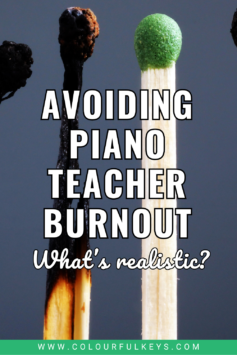
This article about avoiding piano teacher burnout was written by Rosemarie Penner. Rosemarie Penner is an analytical creative … plus online piano teacher and composer at “Must Love Music”! She loves to make learning simple, fun and interactive. When not writing articles (like this one), she enjoys reading and playing video games. For creative ideas and resources, visit Must Love Music.
Many teachers feel a drive to have marvellous marketing, terrific teaching, amazing administrative systems and work-life balance.
How can any piano teacher achieve these impossible goals and NOT suffer burnout?!

The thing is, these desires are often based on elements of perfectionism.
In the first ‘Matrix’ film, Neo makes a visit to The Oracle. While there, a child shows Neo a spoon. Using their mind, the child bends the spoon to their will.
But the spoon isn’t real. It’s a computer program that makes Neo’s brain believe he’s looking at a spoon. Although the spoon doesn’t exist, Neo’s mind certainly does. Neo’s own brain has constructed the idea of a spoon, and his perception trusts that notion.
Unlike the Matrix’s famous spoon, denying you’re struggling with perfectionism-driven burnout doesn’t make it magically go away. But understanding that you can look at the problem a different way is one of the first steps to overcoming it.
Mindset Matters
One of the things I love about being a teacher and studio owner is there’s always something new to learn.
And one of my biggest frustrations is… there’s always something new to learn. 🙃
Perhaps you can relate. It’s the same coin, but different sides when it comes to mindset.
Shift Your Thinking
When perfectionism sets in, revising your outlook is so important. It’s easy to get stuck thinking you should:
- Know all the answers right away
- Follow the “perfect” marketing plan for your studio
- Cover every aspect of learning an instrument at every lesson
- Have flawless balance between work and life at all times
If you suffer from worries like these, try self-talk statements that begin with “I can…” and then fill in the blank with actions that are realistic and attainable.
For example, I can…
- Find answers, as I need them, by asking others or looking online
- Add this idea to a list so I don’t “lose” it
- Cycle through activities so my students are well-rounded
- Tweak my schedule and expectations one step at a time
- Give myself grace when things don’t go according to plan
Why not take a minute to practise reciting some of these phrases right now?
Go ahead; I’ll wait…
Did your shoulders relax? Your breathing slow down? The mind-monkeys quit rattling the cage?🐒
Changing your mindset can have this effect.
Practical Routines
Shifting your mindset is only the first step. A student can think about practising all they want. But if they never play their instrument, they won’t improve.
It’s the same for you when it comes to teaching or running a studio.
Try these two routines that take just a few minutes and ensure you’ll see positives at the end of each workday.
Swap “To-Do” For “Done”
Instead of starting your day with a “to do” list, end each day by writing down the things you’ve accomplished. You can use paper and pen or a digital format to record your efforts.
I chose a digital version so I could easily search for my wins later in the year. (Having this inventory is especially helpful on tough days when it’s hard to see my accomplishments.)
Write down big wins like successful recitals, scheduling refinements and administrative streamlining. But don’t forget to record the smaller victories too, like getting through the first lesson of a new year, finding the perfect music for a struggling student and taking time to do something for your own mental health.
Speaking of…
Nurture Your Mental Health
I’ve realised prioritising my own well-being needs to be just as important as getting all the admin and teaching tasks accomplished, so I’ve added, “What did I do for my mental health today?” to my “done” list.
If you’re struggling with taking care of your own health and wellness, I highly recommend adding this question to your daily record. It’s a great reminder to make time each day for you.
Side note: You can’t nurture your mind without nourishing your body. Enter your info below and Nicola will send you a collection of snack recipes that are just perfect for music studio teachers.

Subscribe to the newsletter and get the piano teacher snack recipes
Enter your details to subscribe to the newsletter for piano teachers with information, tips and offers.
I hate spam as much as you do! I will only send you emails related directly to piano teaching and you can unsubscribe at any time.
VMT members can download the recipes instantly from the Printable Library. Not a member yet? Visit vibrantmusicteaching.com to learn more and join today.
Have a “Day’s End” Routine
Are you able to leave work behind? Or has teacher perfectionism meant it follows you into the rest of your day? To avoid piano teacher burnout, it’s vital to have a routine centred around stepping away from work at the end of the day.
In my schedule, I have blocked time for my end-of-workday routine. I include tasks such as:
- Answering any emails, texts or other communication (if I need time to think about it, I add it to tomorrow’s work)
- Looking at my workload for the next day – Is it reasonable for the time frame I have? What can be removed completely?
- Updating my “done” list, including what I did for my mental health
- Clearing my desk, which signals there are no unfinished tasks or projects for the day
Having a “day’s end” procedure allows you to step away from work with a lot less mental clutter. You’ve dealt with what needs to be dealt with, made your plan for tomorrow, left work with a positive mindset and your wins are fresh in your mind.
Streamline Processes
Teacher perfectionism often comes from trying to personalise everything from emails to lesson planning to studio events. This just isn’t necessary.
I’m a big fan of systems and templates. They’ve allowed me to channel my creativity into new projects rather than using it to deal with routine tasks.
The list of streamlining opportunities is endless, but try starting with some of these:
- Studio communication: newsletters, emails, etc.
- Lesson planning, including keeping an eye on the overall progress of each student
- Dealing with new ideas as you read or hear about them
- Studio events
- Onboarding new clients
Using project management software can help you stay organised and streamline your work from year to year, as Nicola shows you in the following video.
What systems do you need?
There are many ways to individualise without having to start from scratch each time.
Studio Templates
Create frameworks you can modify as needed. Not only does this give you a chance to develop the best wording and layout, but you save time by reusing them over and over.
Design templates for:
- Annual events like recitals: checklist of tasks, recital program, follow-up emails, etc.
- Lesson or annual planning documents
- Social posts for studio announcements or holidays (For example, create 1 – 2 images and reuse each year.)
- Emails/texts on a specific topic such as start of the year, tuition payment reminders, etc.
Vibrant Music Teaching members can access Nicola’s own collection of email templates in ‘Essential Email Templates’, an exclusive course just for VMT members.
Idea Collection
When you see tips and tricks in emails, blogs, social messages or your membership community, collect these nuggets in this way:
- Save the idea to Evernote or another similar program
- Choose whether you need to address it now or later
- Add topic tags so you can easily search the next time you need ideas on that particular subject
By having a system in place, you can avoid “idea overwhelm”.
Bonus tip: Check Evernote for activity ideas during your recital and group lesson planning processes. This saves so much time because you can find them all in one place.
Vibrant Music Teaching has an amazing community of teachers from around the world with all levels of teaching experience, and they chat about anything and everything in the community forum. It’s a great place to pose questions, make requests and discover other ideas!
Overcoming Teacher Perfectionism
Whether it’s a “done” list, a step-away-from-work routine, templates or systems, each action brings you closer to the studio and work-life balance you want, and frees you from perfectionism-induced burnout.
After all, there is no magic “Matrix” spoon. There is no perfection.

Which idea will you try to stave off piano teacher burnout?
Tell us about the one small change you’ll make to be more joyful, more fulfilled and more aligned with your ideal studio.
What a sweet and thoughtful article! This was so helpful on so many levels. Thank you, Rosemarie!
Thank you, Rachel! I’m glad you liked it.
Thank you Nicola – a lovely article. I teach from my studio at home too. At the end of my working day I now have my runners at the ready and I take a little walk, as if walking home from work. It’s like a bridge between my work and home life. I come home refreshed then to my hubby and 3 kids. I hope someone out there finds this useful
Thank you, Nicola for the kind words! That’s fantastic that you go for a walk as your break between work and home life.!